
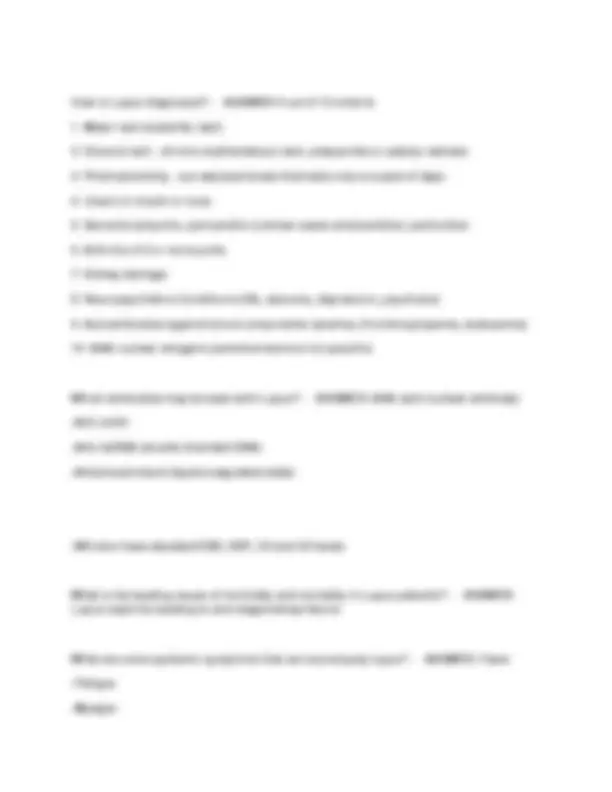


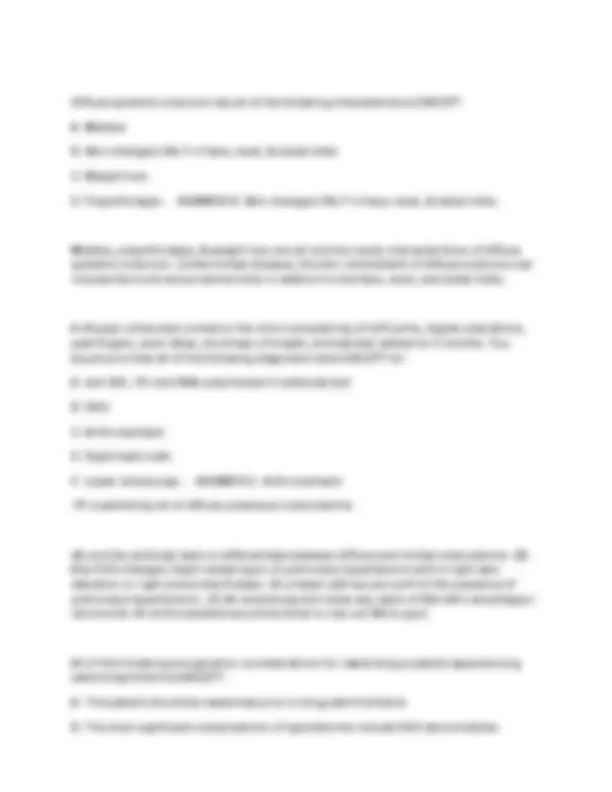
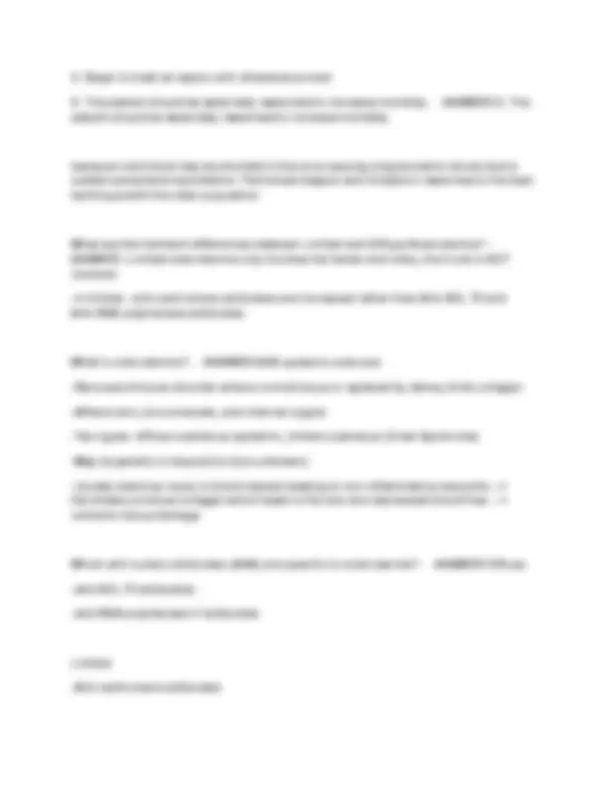
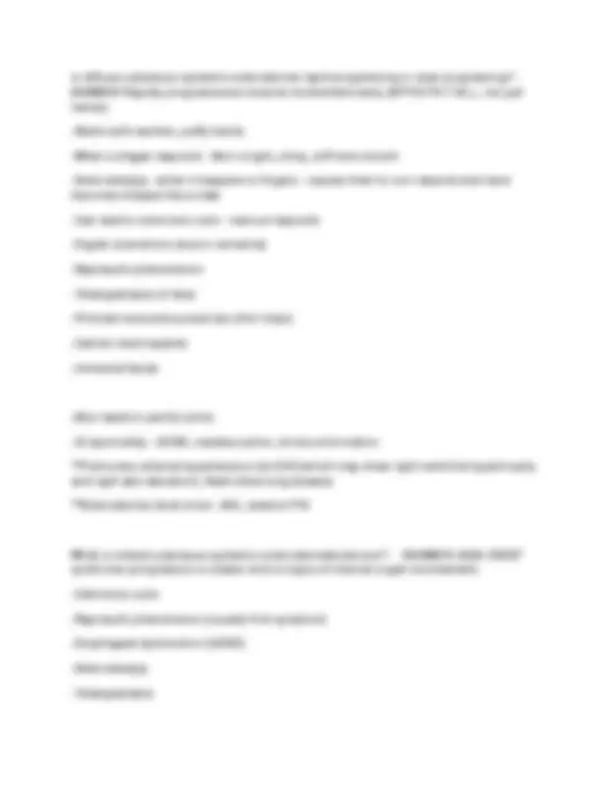
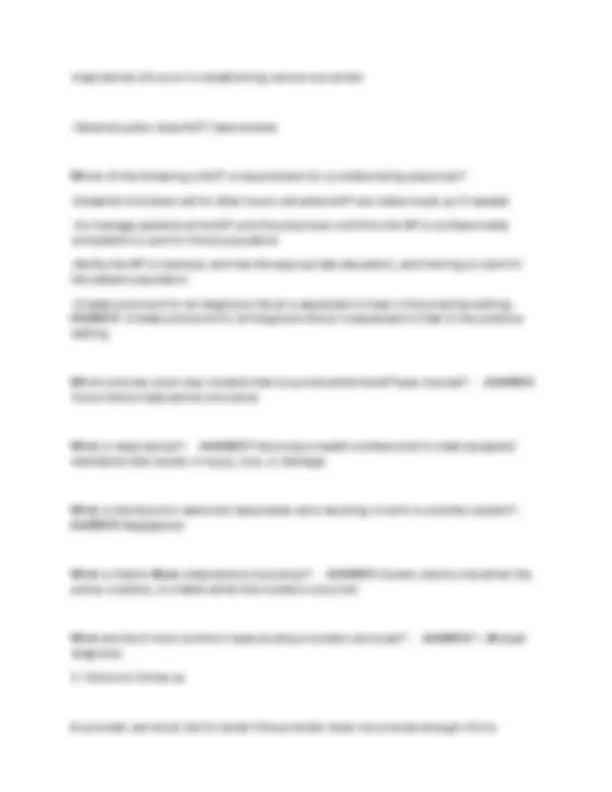


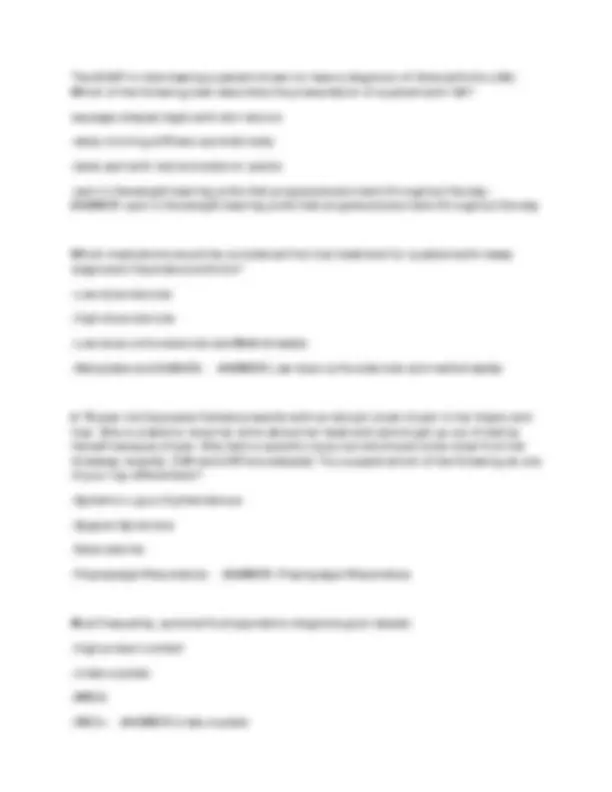
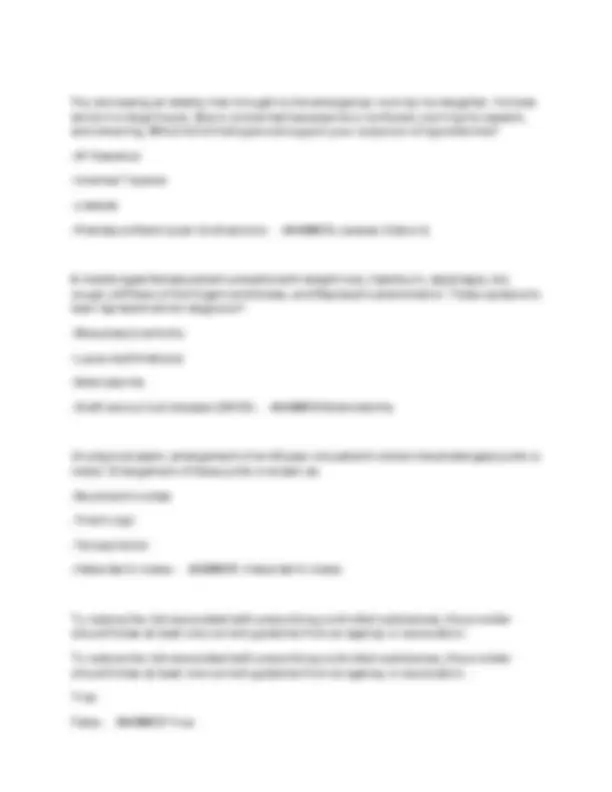
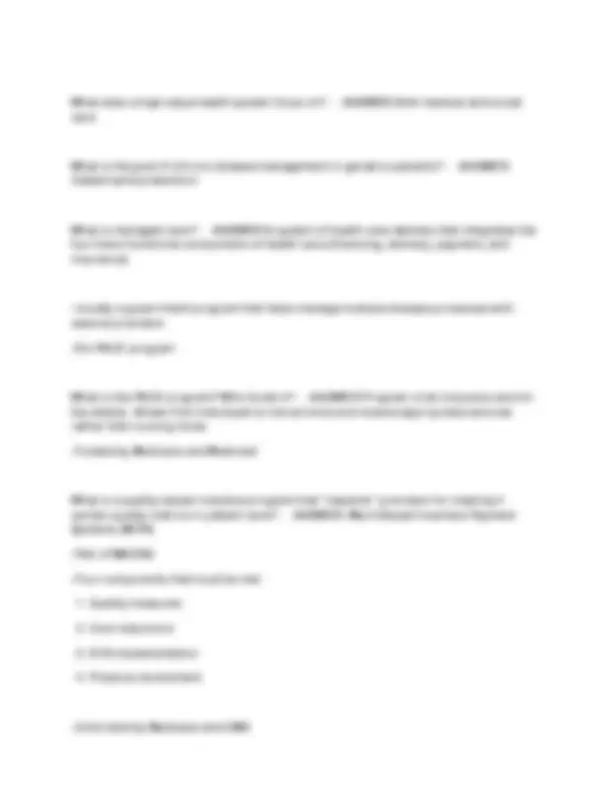
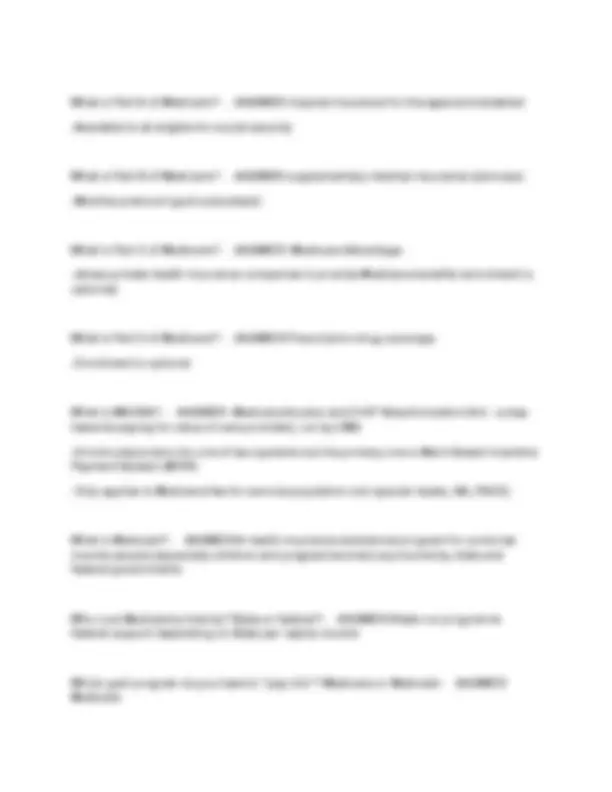
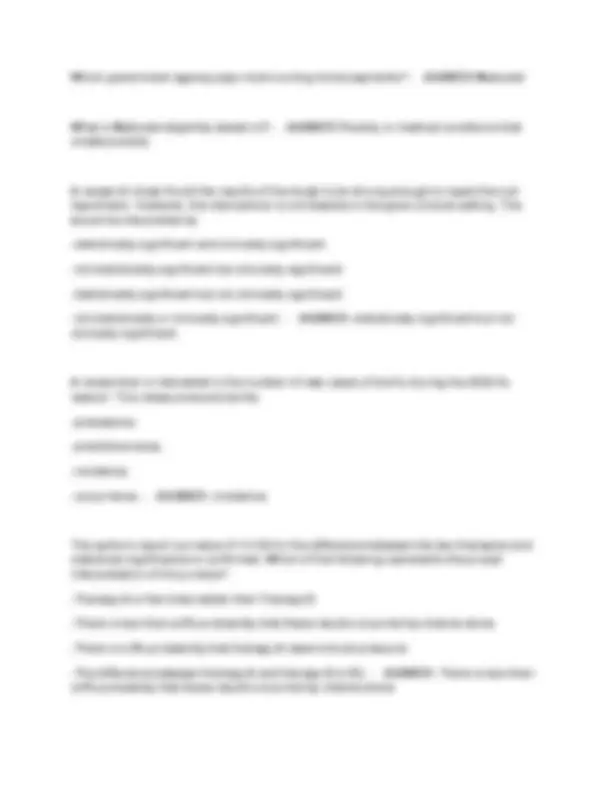
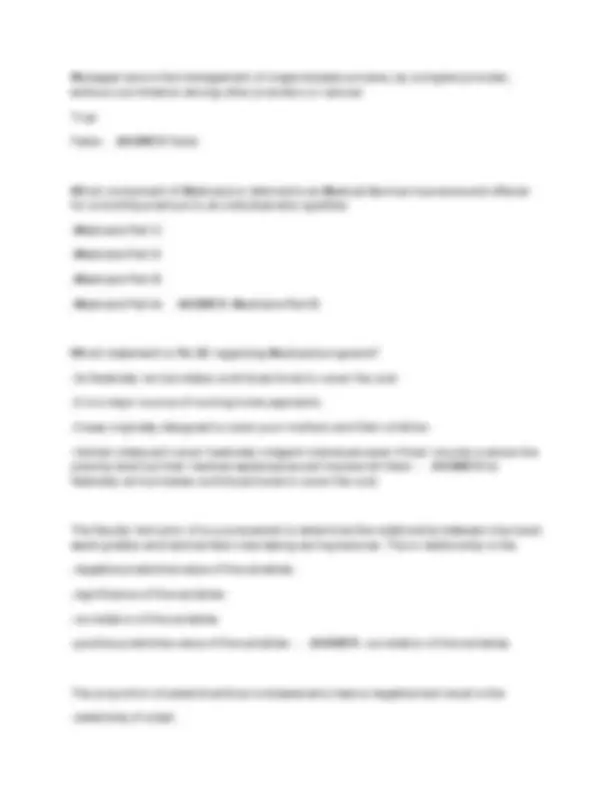


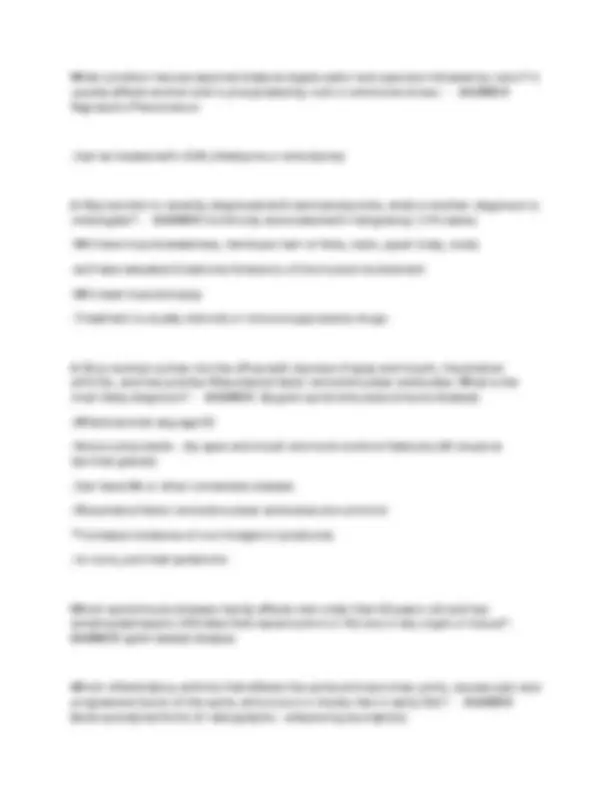



Study with the several resources on Docsity

Earn points by helping other students or get them with a premium plan


Prepare for your exams
Study with the several resources on Docsity

Earn points to download
Earn points by helping other students or get them with a premium plan
Community
Ask the community for help and clear up your study doubts
Discover the best universities in your country according to Docsity users
Free resources
Download our free guides on studying techniques, anxiety management strategies, and thesis advice from Docsity tutors
A comprehensive overview of rheumatoid arthritis, osteoarthritis, and systemic lupus erythematosus, covering key symptoms, diagnostic criteria, treatment options, and common complications. It includes a series of questions and answers designed to test understanding and reinforce learning. Particularly useful for students in healthcare fields, providing a concise and informative resource for studying these autoimmune conditions.
Typology: Exams
1 / 27

This page cannot be seen from the preview
Don't miss anything!




















What are the signs of rheumatoid arthritis? - ANSWER 7 S's
What is the primary cause of mortality associated with rheumatoid arthritis? - ANSWER CV disease r/t vasculitis from cytokines
-Need to prescribe statins to prevent
What lab values will be elevated in rheumatoid arthritis? - ANSWER -ESR and CRP elevated -Autoantibodies for rheumatoid factors -anti-cyclic citrullinated peptide antibodies -Anemia -Thrombocytosis -Mild leukocytosis
What is needed to diagnosis rheumatoid arthritis? - ANSWER 1. Symptoms for at least 6 weeks
What is the treatment for a short-term flare of rheumatoid arthritis? - ANSWER Methotrexate -NSAIDS and glucocorticoids (prednisone)
What are symptoms of osteoarthritis? - ANSWER OSTEO -Outgrowths/osteophytes (Bouchard's node (middle) and Heberden's node (on tips)) - LOOSE BODIES (joint mice) -Stiffness < 30 min in morning -Experience crepitus - bone on bone -Only the joints
Where are Bouchard's nodes? - ANSWER proximal interphalangeal joint -common in OA -Middle part of finger
What are Heberden's node? - ANSWER distal interphalangeal joint -growth of most distal knuckle (Finger tip) -sign of OA
What is an autoimmune disease that can affect any tissue or organ and is marked by periods of illness (flares) and remission? Affects the kidneys a lot - ANSWER Systemic Lupus Erythematosus
-Unintentional weight loss -Lymphadenopathy -Vasculitis -Raynaud's -Thromboembolic disease -Activation of complement system
What are triggers to avoid flares with Lupus? - ANSWER -Exercise regularly -Stop smoking -Avoid the sun -Eat healthy
What is the treatment of lupus? - ANSWER -Moderate Hydroxychlorioquine -Chloroquine -NSAIDs -Short courses of low dose glucocorticoids (<7.5mg/Prednisone/day)
Severe - immunosuppressive meds (mycophenolate, mofetil, cyclophosphamide) followed by low dose glucocorticoids
-May need biologic DMARDs like belimumab or rituximab
What is Libman-Sacks endocarditis? - ANSWER Small vegetations on both sides of the mitral valve; seen in SLE
What medication is appropriate for a person just diagnosed with RA? -NSAIDS
-Prednisone -Methotrexate -Hydrochloroquine - ANSWER Methotrexate
A 60 yo man presents with pain and stiffness in his fingers, mostly in the DIP joints, and in his right knee. What is the best initial treatment? -Methotrexate -NSAIDs or Acetaminophen -Prednisone - ANSWER NSAIDs or Acetaminophen
-DIP joints think osteoarthritis
What are the goals of therapy for those with lupus? SATA -Limit damage -Prevent/minimize flares -Cure the disease - ANSWER Limit damage and prevent/minimize flares
-No cure
What is the treatment for mild to moderate lupus? - ANSWER Hydroxychloroquine and Glucocorticoids
A 46-yo woman presents w swelling around both of her eyes. She has had decreased urination over the past two weeks. She feels malaise and has low-grade fever and joint pain. A urinalysis shows moderate proteinuria (3g) and erythrocyte casts. Lab studies show a hemoglobin of 9.6, BUN of 29, and creatinine of 2. Which differential is most likely? -Lupus -Rheumatoid arthritis
related conditions. Antiphospholipid antibodies are seen in SLE, however is not a specific test to order to diagnose SLE. Anti- double strand DNA and Anti-SM are two antibody tests that are specific to SLE and not sensitive.
Which of the following is NOT diagnostic of systemic lupus erythematosus(SLE)? A. Leukocytosis B. Serositis C. Seizures D. Malar rash (butterfly rash) - ANSWER Leukocytosis
Will see leukopenia instead
While treating a patient in the emergency department, the NP incidentally finds a small pulmonary nodule on the chest x-ray and doesn't disclose this information to the patient or make recommendations for follow-up. Not disclosing this information puts the NP at risk for what? A. Malpractice B. Risk management C. Negligence D. Misdiagnosis - ANSWER C. Negligence
Mary is a 45 yr old female presenting with increasing pain, swelling, and stiffness in her shoulders, hips, and knees over the past 3 months. She notices that her symptoms are worse first thing in the morning but improve after her morning walk. She takes her OTC ibuprofen occasionally when she needs relief. Which tests would you order to confirm your DDX of RA? SATA A. Bilateral plain x-rays B. EKG C. ESR & CRP D. Rheumatoid factor & anti-cyclic citrullinated peptide - ANSWER Bilateral x-rays, ESR and CRP, and Rheumatoid factor and anti-cyclic citrullinated peptide
Diffuse systemic sclerosis has all of the following characteristics EXCEPT: A. Malaise B. Skin changes ONLY in face, neck, & distal limbs C. Weight loss D. Polyarthralgia - ANSWER B. Skin changes ONLY in face, neck, & distal limbs
Malaise, polyarthralgia, & weight loss are all common early characteristics of diffuse systemic sclerosis. Unlike limited disease, the skin involvement of diffuse sclerosis can include the trunk and proximal limbs in addition to the face, neck, and distal limbs.
A 43 year old woman comes to the clinic complaining of stiff joints, digital ulcerations, pale fingers, acid reflux, shortness of breath, and swollen ankles for 3 months. You would prioritize all of the following diagnostic tests EXCEPT for: A. anti-SCL 70 / ant-RNA polymerase III antibody test B. EKG C. Arthrocentesis D. Right heart cath E. Upper endoscopy - ANSWER C. Arthrocentesis -Pt is exhibiting s/s of diffuse cutaneous scleroderma
(A) are the antibody tests to differentiate between diffuse and limited scleroderma. (B) Any EKG changes might reveal signs of pulmonary hypertension with a right axis deviation or right precordial R wave. (D) a heart cath would confirm the presence of pulmonary hypertension. (E) An endoscopy will show any signs of Barrett's esophagus / carcinoma. An arthrocentesis would be done to rule out RA vs gout.
All of the following are geriatric considerations for rewarming a patient experiencing severe hypothermia EXCEPT: A. The patient should be rewarmed prior to drug administration B. The most significant complications of hypothermia include EKG abnormalities
Is diffuse cutaneous systemic scleroderma rapid progressing or slow progressing? - ANSWER Rapidly progressive w visceral involvement early (AFFECTS IT ALL, not just hands) -Starts with swollen, puffy hands -When collagen deposits - Skin is tight, shiny, stiff and smooth -Sclerodactyly - when it happens to fingers - causes them to curl inwards and hand becomes shaped like a claw -Can lead to calcinosis cutis - calcium deposits -Digital ulcerations (due to ischemia) -Raynaud's phenomenon -Telangiectasia on face -Pinched nose and pursed lips (thin limps) -Cannot invert eyelids -Immobile facies
-Also leads to painful joints -GI dysmotility - GERD, malabsorption, stricture formation **Pulmonary arterial hypertension (do EKG which may show right ventricle hypertrophy and right axis deviation); Restrictive lung disease **Scleroderma renal crisis - AKI, severe HTN
What is limited cutaneous systemic scleroderma/sclerosis? - ANSWER -AKA CREST syndrome (progression is slower and no signs of internal organ involvement) -Calcinosis cutis -Raynaud's phenomenon (usually first symptom) -Esophageal dysfunction (GERD) -Sclerodactyly -Telangiectasia
-Limited to face and distal part of limbs -Will have anti-centromere antibodies
What could be indicated if an EKG shows right ventricular hypertrophy with right axis deviation? - ANSWER Pulmonary hypertension
(Can be caused by scleroderma)
What is the treatment for Raynaud's? - ANSWER Treatment:
What is the treatment for scleroderma renal crisis? - ANSWER -Strict BP monitoring -Look for sudden increase in BP -ACE inhibitor for BP control -CCB (amlodipine) -Diuretics -Alpha-blockers
A 49 yo female patient presents w weight loss, symptoms of GERD, stiff joints, and Raynaud's phenomenon. These symptoms best represent which diagnosis? - ANSWER Scleroderma -Female -Around 50 yo -Weight loss (usually from malabsorption or GI upset) -GERD
malpractice info prior to establishing care w a provider
-General public does NOT have access
Which of the following is NOT a requirement for a collaborating physician? -Establish 2nd level call for after hours call where NP can obtain back up if needed -Co-manage patients w the NP until the physician confirms the NP is professionally competent to care for the pt population -Verify the NP is licensed, and has the appropriate education, and training to care for the patient population -Create protocols for all diagnosis the pt is expected to treat in the practice setting - ANSWER -Create protocols for all diagnosis the pt is expected to treat in the practice setting
Which policies cover any incident that occurred while the NP was insured? - ANSWER Occurrence malpractice insurance
What is malpractice? - ANSWER Failure by a health professional to meet accepted standards that results in injury, loss, or damage
What is the failure to exercise reasonable care resulting in harm to another patient? - ANSWER Negligence
What is Claims Made malpractice insurance? - ANSWER Covers claims only when the policy is active, no matter when the incident occurred
What are the 2 most common reasons why providers are sued? - ANSWER 1. Missed diagnosis
A provider can be at risk for what if the provider does not provide enough info to
consent, in an informed way, to the treatment? - ANSWER Negligence
What is the goal of evidence-based medicine? - ANSWER Positive impact on the patient's outcomes
What is the first step of conduction a research study?
What is the last step? - ANSWER 1. Formulate a research problem
Which research design is more susceptible to biases? -Qualitative -Quasi-experimental -Cohort -Cross-sectional - ANSWER Qualitative
Which research design helps provide answers to the questions of who, what, when, where, and how associated w a particular research problem? -Qualitative
-In vitro -Case series - ANSWER Meta-analysis
Rate of people developing a disease in the population during a defined time period is known as -Positive predictive value -Likelihood ratio -Prevalence -Incidence - ANSWER Incidence
The accuracy of the measure or if the results represent what they are supposed to measure is known as -Validity -Reliability -Sensitivity -Negative predictive value - ANSWER Validity
The probability of obtaining the observed values if the null hypothesis is true is known as what? - ANSWER P-value
If the alpha level for a study is set at 0.05 and the p-value of the study was found to be 0.01, what would one conclude from this finding? - ANSWER There is a statistical significance
If a p value is < 0.05 for the difference between two therapies and statistical significance is confirmed, what can be interpreted by this P value - ANSWER There is less than a 5% probability that these results occurred by chance alone
What is polymyalgia rheumatica?
What is it commonly associated with? - ANSWER -Inflammatory disorder that causes pain/stiffness in shoulders and hips Sx: pain and stiffness in the neck, shoulders and pelvic girdle in a woman >50yo with an elevated ESR and morning stiffness lasting over one hour difficulty lifting arms above shoulders Tx: if not assoc with giant cell arteritis: low dose prednisone
When is the pain most severe in polymyalgia rheumatica? - ANSWER In morning and at night, improve after activity and last more than one hour -May be hard to lift arms above shoulder height
What are some factors that predispose older adults to infections? - ANSWER -Environmental factors -Physiological changes (lung, bladder, skin, glucose homeostasis) -Specific diseases (malignancy, DM, prostatic hypertrophy) -More frequent and longer hospital stays
What are the 3 most common causes of pneumonia? - ANSWER -Streptococcus pneumoniae -Human rhinovirus -Influenza
What is the most common organism that leads to meningitis? - ANSWER Streptococcus pneumoniae
What is hypothermia? - ANSWER when the body temperature is < 95
What is hyperthermia? - ANSWER high body temperature > 105
You are seeing an elderly man brought to the emergency room by his daughter. He lives alone in a large house. She is concerned because he is confused, slurring his speech, and shivering. Which ECG finding would support your suspicion of hypothermia? -ST Elevation -Inverted T-waves -J-waves -Premature Ventricular Contractions - ANSWER J-waves (Osborn)
A middle aged female patient presents with weight loss, heartburn, dysphagia, dry cough, stiffness of the fingers and knees, and Reynaud's phenomenon. These symptoms best represent which diagnosis? -Rheumatoid arthritis -Lupus erythmatosus -Scleroderma -Graft versus host disease (GVHD) - ANSWER Scleroderma
On physical exam, enlargement of an 83 year old patient's distal interphalangeal joints is noted. Enlargement of these joints is known as: -Bouchard's nodes -Tinel's sign -Tenosynovitis -Heberden's nodes - ANSWER -Heberden's nodes
To reduce the risk associated with prescribing controlled substances, the provider should follow at least one current guideline from an agency or association. To reduce the risk associated with prescribing controlled substances, the provider should follow at least one current guideline from an agency or association. True False - ANSWER True
What does a high-value health system focus on? - ANSWER Both medical and social care
What is the goal of chronic disease management in geriatric patients? - ANSWER Catastrophe prevention
What is managed care? - ANSWER A system of health care delivery that integrates the four basic functional components of health care (financing, delivery, payment, and insurance)
-Usually a government program that helps manage multiple disease processes with several providers -Etc PACE program
What is the PACE program? Who funds it? - ANSWER Program of all-inclusive care for the elderly. Allows frail individuals to live at home and receive appropriate services rather than nursing home. -Funded by Medicare and Medicaid
What is a quality-based incentive program that "rewards" providers for meeting 4 certain quality metrics in patient care? - ANSWER -Merit-Based Incentive Payment Systems (MIPS) -Part of MACRA -Four components that must be met:
-Controlled by Medicare and CMS